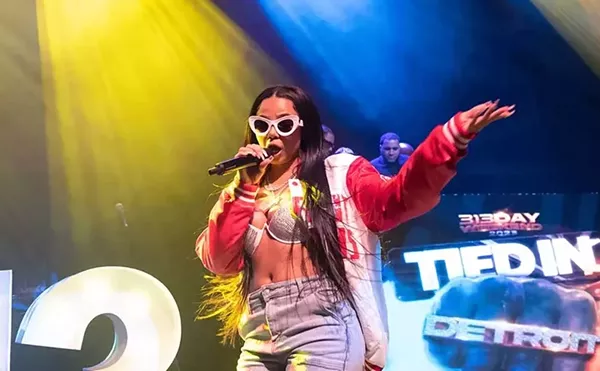Is white the new black?
In a disturbing brush of irony-free PR manipulation, a story in Vibe magazine's August issue positioned Florida heroes 'N Sync in their strangest context yet, placing them at the forefront of some grand R&B evolution and seemingly signaling to the magazine's predominately African-American readership that, yeah, it's OK to like 'N Sync. Because, y'know, they're dope. Maybe even doper than their darker skinned peers.
Unlike the Osmonds, whose Mormon toothiness brushed off Jackson 5 comparisons nearly 30 years ago (anyway, what color is Michael now?), 'N Sync are more than willing to assume their hybrid position, donning cornrows and throwing street slang at every publicizable turn. And while the implications of such posturing are admittedly severe — stirring an across-the-message-board fan and detractor frenzy — they are extremely laughable. They may be pretty fly for white guys, but 'N Sync are still very, very white. Deltona white. Mickey Mouse Club white. Why are we even thinking about this?
"I know if I was black I probably could sing 10 times better and riff a lot easier," enthused Joey Fatone in Vibe's furtherance. It's apparently time for someone to expand their audience. Hmmm, what if Britney was black, too?
Back in the day, the foundations for the boy-band template were laid by Maurice Starr ("The General," he called himself, sporting full Napoleon regalia, and seemingly losing his mind), when he maxed out on the black audience with New Edition and sought universal white acclaim with the marketable street toughness of New Kids on the Block.
Accordingly, the New Kids weathered the black route, even popping up on the "Showtime at the Apollo" stage for a litany of boos turned to cheers. It was a racist Cinderella story, really, but somehow excusable with The General holding ultimate rank in the mission of taking black music to "the people."
Oh, oh, oh-oh-oh.
Enter Johnny Wright, then a tour manager for New Kids. Backed by the lofty financial resources of Big Poppa, Lou Pearlman, and his collection of touring aircrafts and, well, blimps, the Backstreet Boys were set to fly. Except, at that time they were really, really white. German tour white. Bleached-teeth white. Eventually, they broke through, fermenting in their leashes away from Lou's camp and into derivative soul balladry.
Fast on their choreographed heels came the slightly edgier, certainly younger gyrations of J.C., Justin, Joey, Lance and Chris. 'N Sync were the whiter antidote to Backstreet's imminent blackening, pulsating high-energy dance in the face of the Boys assumed urban decay.
As if on cue, 'N Sync likewise seceded from Pearlman's powerful waistline, only they took Johnny with them. His love of the herky-jerky metallic soul of late-'90s MCA recording acts (Bobby Brown, Jody Watley), along with the band's steaming divorce anger, fueled the jump-hop of their second record, No Strings Attached. Before long the band were waving "Bye Bye Bye" to their cheeky coordinated sweat suits and learning to weave their hair to the tune of R&B almost-classics like Johnny Kemp's "Just Got Paid."
With their third release, Celebrity, riding high on the charts in short order — it officially hit the streets July 24 — and the requisite "creative control" on the rise, 'N Sync seems perfectly fit now to dive headfirst into exploitative stereotyping. What's odd is that Vibe, Quincy Jones' middling attempt at solidifying a separate black culture, is so willing to play into it that the entire second half of the article entertains the tired notion of white men and dancing.
"We're white boys and we know it," doughy Lance was quoted. "Especially me, 'cause I can't dance as good as the other guys." Added central heartthrob and fro experimentalist Justin, "I see what some of these lead singers in rock groups call dancing, looking like y'all about to get a hernia. And that's cool as long as your not hurting anybody. Shake ya ass, but watch ya self!"
Grammar be damned. Nobody, however, seems to care. Vibe writer Mimi Valdes blithely solicits testimonials from "real" black artists ready to rise to the defense of the new model:
"I have become the torchbearer for letting our people know that these guys are for real. These guys can really sing. There's no tampering, no computer-generated this or that moving things around," argued soul balladeer, Brian McKnight, without a touch of sarcasm.
"I never expected to get that respect from the rappers and R&B artists," responded J.C., adding the unnecessary teeth of "I don't know how the ghetto pass happened, but I'm glad it did."
Ghetto pass?
Further superfluous exploration into credible influences — and the fact that Chris even has a black stepfather with an Earth Wind & Fire collection ("I wasn't allowed to set foot in that room, or he'd beat the shit out of me!" Charming.) — dilute an argument that would probably go better unsaid, really. 'N Sync may be the pop version of Eminem, but they can't really be the white version of all things black. Can they?
Don't ask Vibe. In what may be the most bizarre scenario crafted in the black-angled piece, Valdes catches no-nonsense Chris catching shit (literally) from a passing bird, and simply wiping it off and moving on. Y'know, like a brother would.
"They're way too cool and down-to-earth to let a little doo-doo freak them out," intellectualizes Valdes. "Even as pop's latest phenomenon, they refuse to take themselves too seriously."
Maybe they have the right idea.
Billy Manes writes for Orlando Weekly, where this feature first appeared. E-mail comments to [email protected]





